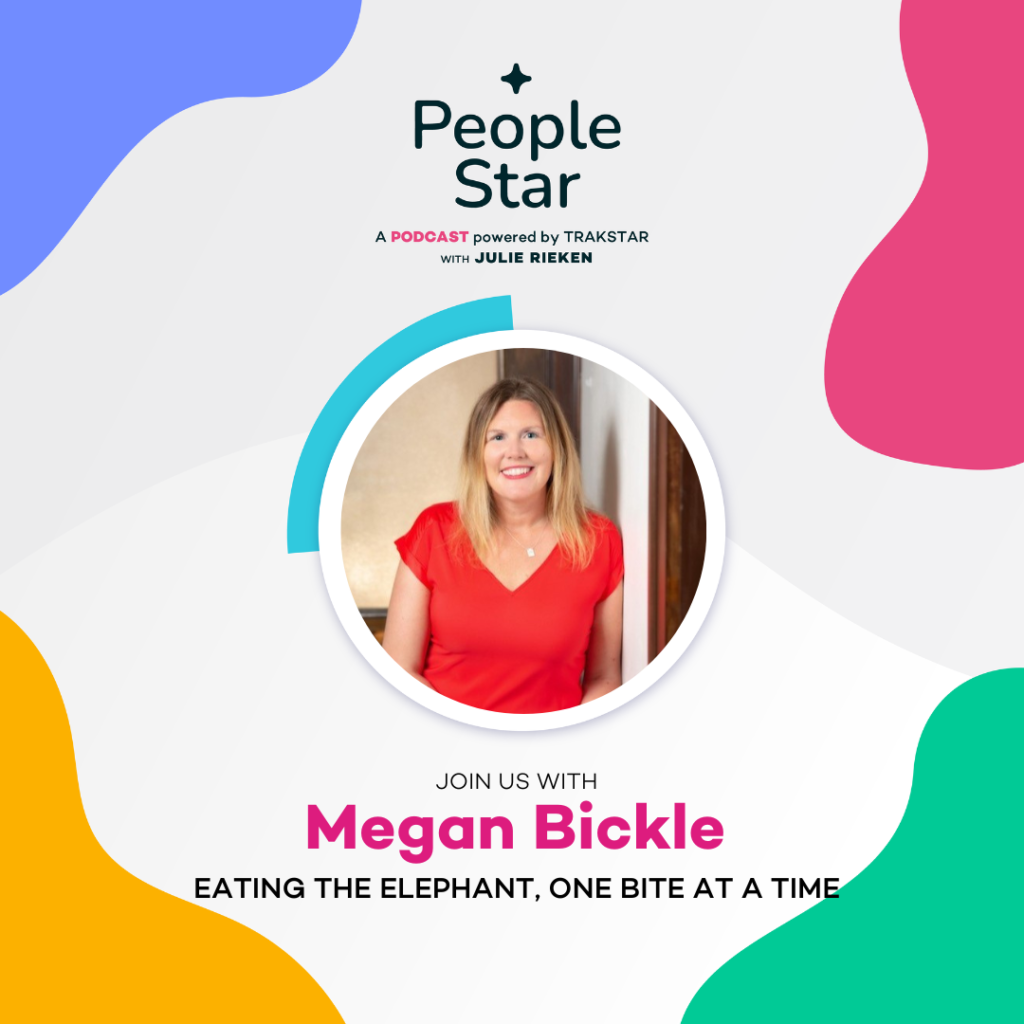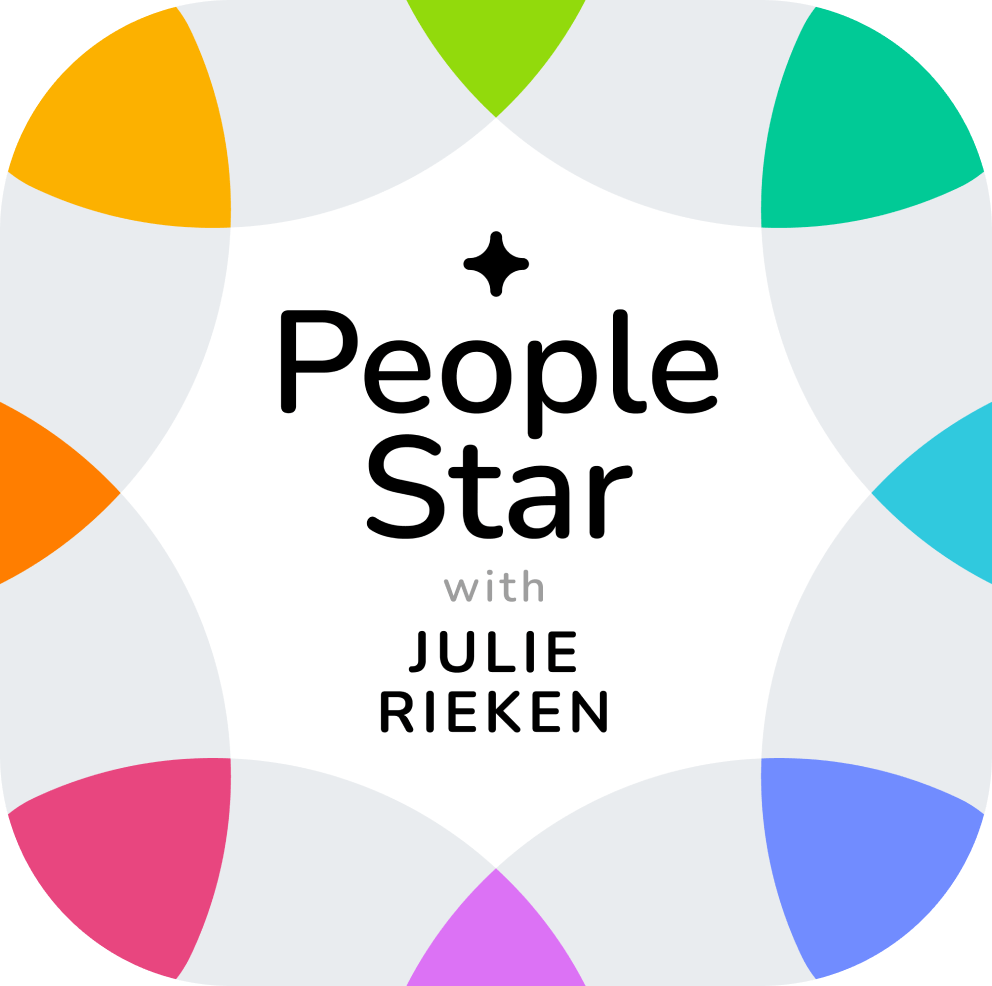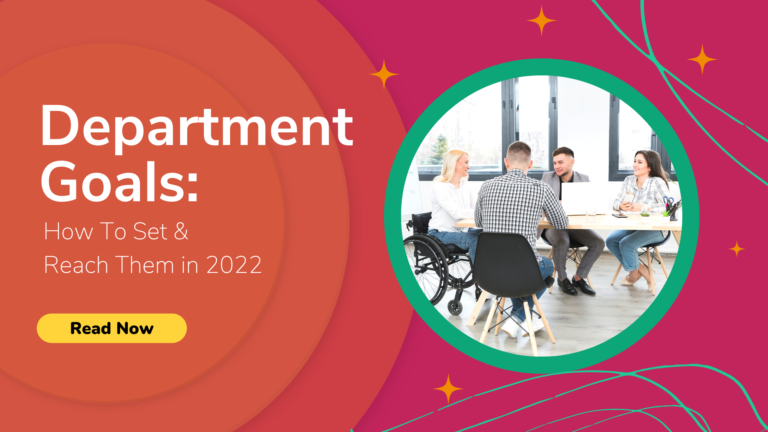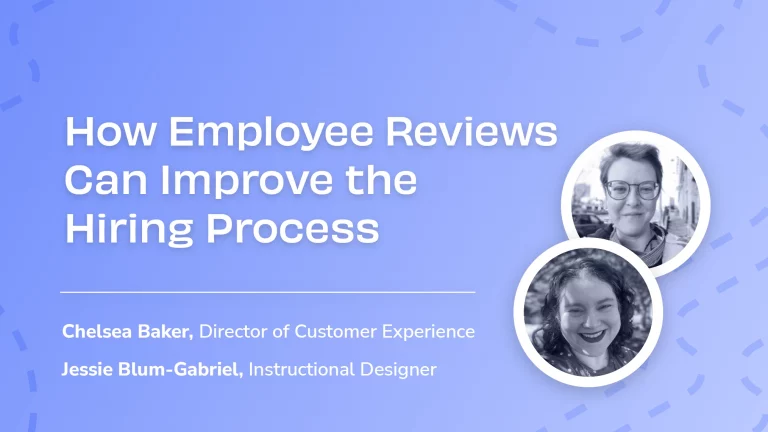PeopleStar_Megan Bickle: this mp3 audio file was automatically transcribed by Sonix with the best speech-to-text algorithms. This transcript may contain errors.
PeopleStar Intro:
Welcome to the PeopleStar Podcast. We deliver leadership perspectives from industry experts on their people, architecture, routines, and culture as they solve HRs newest challenges. And now your host, Julie Rieken.
Julie Rieken:
Hello podcast listeners. Julie Rieken here, host of PeopleStar Podcast, and I am so thrilled today to have Megan Bickel with us. She leads employee engagement and culture at Western Digital, and she's passionate about the future of HR and shaping an organization's culture through talent and organizational development initiatives. She redesigns performance management to leading capability development, she empowers HR leaders with analytical insights, and her work has spanned across all aspects of talent management, with an emphasis on change management and organizational transformation. And she's got a really cool resumé, previous roles at Dropbox, GE Digital, and Ubisoft and a master's in Organizational Development from University of San Francisco and bachelor's in organizational leadership from Marquette. Last thing she's an avid runner in training for Berlin Marathon this September, which I know we're going to have a connection on, Megan, and I'm super excited to have you here whether it's to talk about running, engagement and culture, HR or all three of the things together. Welcome!
Megan Bickle:
Thank you, Julie. I'm so excited for this conversation!
Julie Rieken:
Me too. You know, one of the things, let's just start with this one. I love this question because we have found out that we have running in common. Can you share with me something that you might have learned from a hobby, maybe running, that applies to engagement, culture, and the world of HR, which our listeners come from?
Megan Bickle:
I'd be remiss if I didn't give a running analogy. So, as you mentioned, I am an avid runner, I'm training for the Berlin Marathon. And just to share with all of our listeners, a Marathon is 26.2 miles.
Julie Rieken:
…
Megan Bickle:
Point two. You can't forget that extra point two. One aspect of marathon training is the long run. You've got a 16-mile run, an 18-mile run, and a 20-mile run. So fun fact you never fully train the 26.2 miles during marathon training, you save that for race day. One thing that I've learned through running, through marathon training, is just how to break things down into manageable pieces. I was using this phrase of how do you eat an elephant? Well, one bite at a time, and it's the same when you're facing these large organization scale changes, such as culture, performance management, the future of work. You know, everything that we're faced with today, redesigning, reimagining the scale of the complexity. And so just breaking it down in terms of, okay, well, what's what can we focus on for the next three months or the next six months? Yes, the final result, that marathon, that 20-mile run, like what is good look like? How will we know that we got there, and how will we celebrate? But to kind of break it down so you're not getting overwhelmed, I know my very first 20-mile run, I broke it down into different pieces and had friends meet up with me along the way. And lastly, I had a friend that left me around mile 18 to go to a restaurant to order some food. So when I finished my run, I would, I would have some much-needed carbs and to celebrate. And so I think, you, from, from running, just that mental toughness of how to take a deep breath and really assess the complexity of the project or the initiative and break it down into things that are manageable to make it a little more interesting, engaging and definitely less overwhelming.
Julie Rieken:
I love that, as they would say in Boston, that's so smut. What good thing to do, way to break it down. You know, and today, engagement and culture is bigger and more important than it's ever been. So when I think about the kind of work that you're doing and its importance, it is like eating an elephant. It is a big task today for organizations to think about engagement and culture. Can you talk about how you think about breaking down that elephant, elephant, so to speak, at Western Digital? How do you put a framework around engagement and culture, and how do you approach it?
Megan Bickle:
Culture is amazing and amorphous, right? I mean, everyone's talking about culture. And what I like to do is to break it down in terms of, well, how, what does it feel like to work here? Like, what does it feel like to be a member of this team? What are some of the norms? For example, are there certain tools that we use? Like do we use Zoom versus WebEx? What are some of the rituals? Like do we have, how do we celebrate when people take on new roles or people joining the organization or when people leave? What is that social element, as more and more of us are in hybrid roles or on global teams? So taking culture as this big, amorphous, you know, what does it feel like? But then breaking it down into context for employees, for leaders, for functions, and just being really clear, like what does it feel like to be a member on this team? It's like, oh, well, as a new member of this team, you know, you are, we are going to announce you in our monthly all-hands and everyone on the team is going to reach out to you and put time on your calendar just to get to know you. And our team has created documents called Working with Me where it kind of details, if you need Meghan to do strategic thinking, block time with her before 3 p.m. because after 3 p.m. she loses her ability to string cohesive adjectives together in a sentence. And so it would be these elements, like these norms, the behaviors, the rituals, how do we communicate? Are we video on or video off? Do people eat during meetings? How do we work through conflict? Like all of these pieces together are tangible aspects of culture, and so when assessing what is the culture on our team or what is the culture of our organization, getting really crisp on asking some of these questions, and the beauty of it is none of this is good or bad. This is simply what it looks like for our team, for our organization, and then where do we need to assess? You know, so thinking of it like a temperature gauge of us the room too hot? Ok, well, what do we need to do to cool down the room so it feels a little bit more comfortable, and just recognizing are there elements of our culture that are impeding our ability to be innovative, for example? Like I've worked in a culture that was too nice and what that means is healthy conflict or disagreement wasn't occurring. And it was a lot of like, yes, let's make that happen, yes, we can, and to the impact of innovation or timelines, etc… And so I think the beauty when assessing culture, I really approach it through, none of this is bad, minus the whole caveat on like toxic cultures, but it really is what works for us, our team, our function, our organization in terms of who are we trying to be and what are we trying to accomplish, and then what are those elements that we need to either dial, dial things up or dial things back, but again, like being really crisp on what are the norms and behaviors and rituals that come to light here.
Julie Rieken:
That's super interesting. I wrote that down, norms, behaviors, rituals, how does it feel to work here? And you said something I'd like to pull a thread on. You said that culture's amorphous and I think that, I think that's really true, it inhabits peaks and its valleys. Have you ever had to work in a place or do you have any stories about when you've had to maybe adjust the culture? The temperature was too hot or too cold. Do you have any adjusting culture stories or thoughts on how to do that?
Megan Bickle:
Yes. At an organization, we were really leaning into parameters of building a learning culture. And I say that like I know a lot of companies are focused on, well what is a learning organization look like? And we took a systems-based approach in terms of what are all the areas that this could show up? And one example was within our job structure. So as we were hiring principal software engineers, we layered in an expectation and component of part of your job is to share, teach back, hold your teams accountable to continual learning. And so at that principal level, really making it clear we're hiring you for your domain expertise and you need to share this. And so how, how could we start to embed more of like brown bag lunch situations, recognizing across the organization we had some huge capability gaps that we weren't going to solve simply through hiring more talent. But we could be strategic about telling new people that are coming in, like, here's the expectation. You attend a conference, you need to do a teach back, you need to share this knowledge rather than keeping it to yourself. And that's, that was one small tweak by adding it to the job description, you to, to the framework to the expectations of bringing new talent. But then also to scale that mindset across the organization of any time somebody requested to go to a conference or an external event, great. Again, you can go to this event and the expectation is you will do a teach back to your team, to the function, etc., to share what you've learned. And in some cases we might record it, we might stream it live to broaden who can participate from this. But really making that crystal clear of it's not just for Megan to go to this conference and learn all these things, Megan is expected to share what she's learned with others and how is it relevant to the team, to the business, etc…
Julie Rieken:
That is a great idea. And just as a follow up, what effect do you think that had? As a result, the teach back. What was, what was the lasting effect?
Megan Bickle:
One lasting effect, you know, it broadened the knowledge. … When, you know, previously, when people would attend conferences, it happened in a silo. So you would never know about it unless you saw somebody out of office. So this change the mindset where I noticed teammates would then preemptively send a note out saying, I'm attending this conference, here's the agenda, you know, please let me know if there's any questions you have in advance or suggestions of different sessions that you might be interested in, I'm going to come back and share, share what I've learned. So it also helped in terms of the transparency of who's attending but, and why and also how learning and development budgets were being spent. And so kind of broadening the ROI of okay, we spent $1,000 dollars for Megan to go to this conference, but look at the impact, she came back, did it teach back for her team, she gave a little presentation in the HR all-hands, which has a reach of 400 plus employees, etc., etc.. And then also you tying in into how is Megan continually developing her own skills and capabilities and the level of influence and how is she seen as a subject matter expert based on all these things? So your multiple check the box of the impact by making one switch of being more overt in the expectations around how people are sharing what they're learning.
Julie Rieken:
That's a really important cultural impact, I love it. Okay, I have, I want to go back to one other thread that we started, and I want to know. You said tools, rituals and celebrations, and one of my favorite things to hear about are the coolest celebrations or a celebration, when you think about a team that does a celebration that you're like, oh, that's a fun one. Do you have a couple of things that you've heard that you love that are ways that teams do celebrations and anything that popped in your head when I said celebrations? Can you tell us about a couple of those? Because I love for people to have fun ideas on how to celebrate.
Megan Bickle:
Yes. So two came to mind immediately. So one is a ritual that I've brought with me, from very early on in my career. It was a ritual that I borrowed from a colleague. And so any time a member of the team either leaves the organization or leaves the team to take on a new role, I've implemented this ritual and I've brought this in every company I've worked, I've implemented this ritual of getting the Dr. Seuss book, All the Places You Will Go, and then passing it along to anybody that has worked with the departing colleague for them to leave a note of congratulations, best wishes, etc. So rather than just giving a card that everyone signed that we all know the employee is going to throw the card out in a week or two, because who keeps cards? Now they've got this great book kind of cherishing onto the next adventure, you were signed by all their colleagues. So that's a favorite tradition that I've implemented.
Julie Rieken:
Okay, and you had another.
Megan Bickle:
Another. The use of Zoom backgrounds.
Julie Rieken:
Tell us …
Megan Bickle:
A tradition that I've seen is like, for example, a colleague got married and so the entire team made a zoom background of the colleague that got married, like their face among hearts. And so just getting really creative. So then, then the colleague shows up to the meeting and everyone's got this virtual background celebrating that. And so just being creative with how you can use Zoom backgrounds to, to celebrate.
Julie Rieken:
Super fun in a remote world. We haven't done that here recently. Maybe we did early on in the pandemic. I think we'll need to reinstate that, that's a really, that's cool.
Megan Bickle:
It's fun. Like easy one, low cost.
Julie Rieken:
Super fun. Okay, cool. All right, let's wrap. I've got one final question for you. You're an expert in this field of engagement and culture, are you reading anything we should be reading right now? Can you give us some thoughts on that?
Megan Bickle:
Yes, fabulous question. So I just picked up this book called ReCulturing by Melissa Daimler, and the premise is design your company culture to connect with strategy and purpose for lasting success. I followed Melissa's career, I got to meet her when I was a grad student at the University of San Francisco, and she was at Adobe at the time, working with Donna Morris, who is now the executive vice president and chief people officer over at Walmart, so some amazing women. So Melissa's book just came out a couple of weeks ago, so I'm just getting into it. But so far it's amazing and perfect timing because it's on all the topics we just discussed, culture and engagement, organizational change.
Julie Rieken:
I love it. Okay, We'll put that in the podcast notes for everybody. ReCulture, Melissa Daimler, and Megan Bickle, thank you for your insights today. This has been super fun and people are going to walk away with a couple of good ideas. I love it. Thanks.
Megan Bickle:
Well, thank you, Julie. This has been so fun.
PeopleStar Outro:
Thanks for listening to the PeopleStar Podcast. For the show. notes, transcript, resources, and more ways to get a seat at the table, visit us at TrakStar.com/Podcast.
Sonix has many features that you’d love including automated translation, share transcripts, automated transcription, secure transcription and file storage, and easily transcribe your Zoom meetings. Try Sonix for free today.




